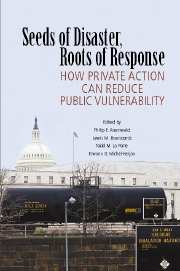Book contents
- Frontmatter
- Contents
- List of Contributors
- Foreword, by General Robert T. Marsh
- Preface
- Acknowledgments
- I SEEDS OF DISASTER
- II A CRITICAL CHALLENGE
- III MANAGING ORGANIZATIONS
- IV SECURING NETWORKS
- 11 Complexity and Interdependence: The Unmanaged Challenge
- 12 Managing Reliability in Electric Power Companies
- 13 Coordinated and Uncoordinated Crisis Responses by the Electric Industry
- 14 Electricity: Protecting Essential Services
- 15 A Cyber Threat to National Security?
- 16 Interdependent Security in Interconnected Networks
- V CREATING MARKETS
- VI BUILDING TRUST
- VII ROOTS OF RESPONSE
- References
- Contributors
- Author Index
- Subject Index
11 - Complexity and Interdependence: The Unmanaged Challenge
Published online by Cambridge University Press: 30 July 2009
- Frontmatter
- Contents
- List of Contributors
- Foreword, by General Robert T. Marsh
- Preface
- Acknowledgments
- I SEEDS OF DISASTER
- II A CRITICAL CHALLENGE
- III MANAGING ORGANIZATIONS
- IV SECURING NETWORKS
- 11 Complexity and Interdependence: The Unmanaged Challenge
- 12 Managing Reliability in Electric Power Companies
- 13 Coordinated and Uncoordinated Crisis Responses by the Electric Industry
- 14 Electricity: Protecting Essential Services
- 15 A Cyber Threat to National Security?
- 16 Interdependent Security in Interconnected Networks
- V CREATING MARKETS
- VI BUILDING TRUST
- VII ROOTS OF RESPONSE
- References
- Contributors
- Author Index
- Subject Index
Summary
Managing a particular firm or organization, with all its complexity, to ensure reliable service and resilient response to disaster is a significant challenge in and of itself. However, the magnitude of the challenge has dramatically intensified in recent years due to deep and growing interconnections among organizations that provide critical services. Some connections occur among firms comprising a single infrastructure industry; these compel direct competitors in the marketplace to cooperate in security matters. In other cases, where the physical infrastructures are owned by the government (for example, harbors, airports, and highways) and services using these facilities are provided by commercial firms (for example, ships, planes, and trucks), interdependence crosses public and private institutional boundaries.
Considerable concern exists about cascading failures among tightly interdependent infrastructure systems. This concern has provoked efforts to understand the technical and operational dimensions of interdependence through various forms of modeling and simulation. Large-scale systems have a variety of organizational structures. These structures need to be flexible in adapting to rapidly changing situations. Most pervasive and difficult to manage are the interdependencies that exist among firms in different infrastructures – water authorities that depend on electric power for their pumps, or hospitals that depend on transportation providers for the delivery of needed supplies. In all of these cases, accountability for assured continuity of service is limited. Managers of firms providing infrastructure services must consider the implications of these interdependences and devise ways to address them.
- Type
- Chapter
- Information
- Seeds of Disaster, Roots of ResponseHow Private Action Can Reduce Public Vulnerability, pp. 157 - 163Publisher: Cambridge University PressPrint publication year: 2006
- 2
- Cited by



